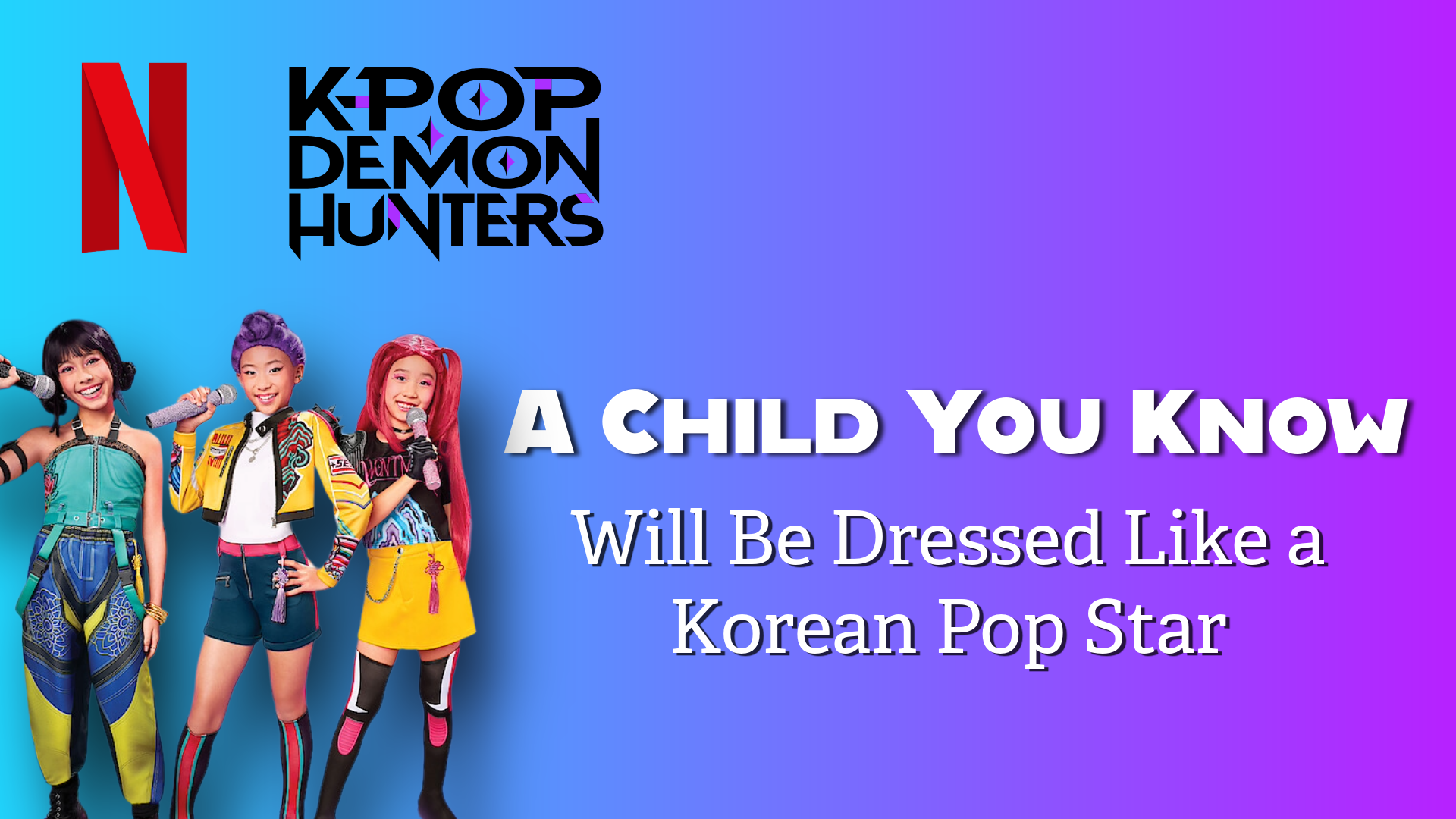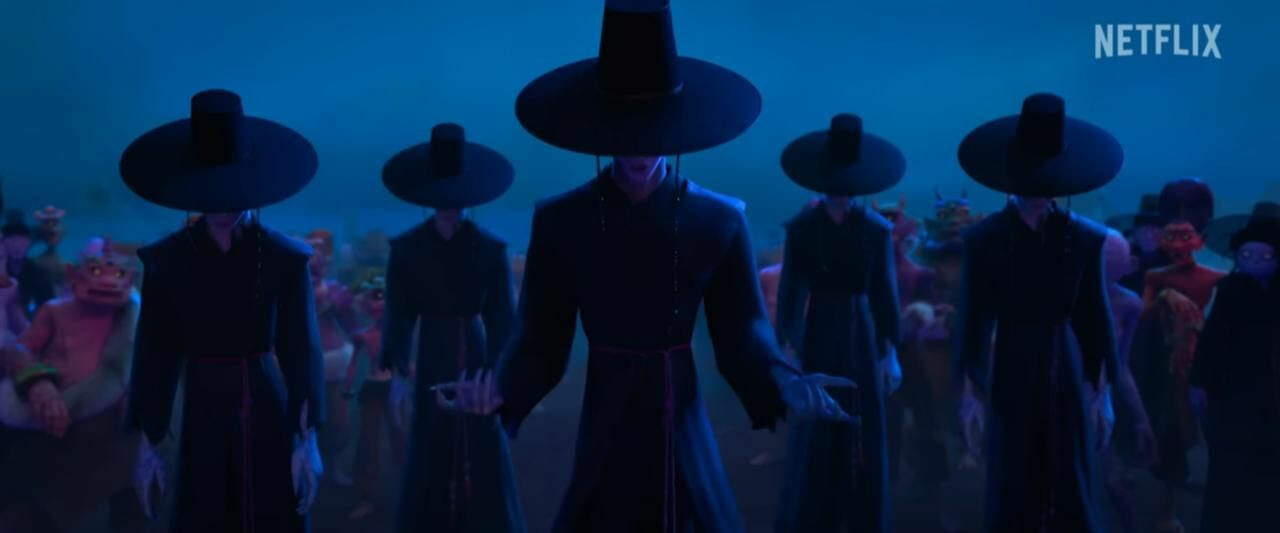
A ceaseless host of candy hungry children will be swarming neighborhoods across the United States over the next week, and a large portion of those kids will be dressed up as Korean music stars from a recent Netflix movie called Kpop Demon Hunters that’s taken the world by storm. And it might be good for parents and pastors to have at least a passing understanding of what that means.
Kpop Demon Hunters is an animated film featuring music created by famous Korean pop artists and performers, first released by Netflix on August 23rd, 2025. In the two months since its launch, Kpop Demon Hunters racked up more than 325 million watches, according to some sources. And that doesn’t count the subsequent release the film saw in U.S. theaters in October.
It’s a staggering figure for a film on an exclusive platform like Netflix which itself has roughly 300 million subscribers. The implication is that the film has been watched more times than there are people to watch it, which means people are watching it over and over again. Kpop has also seen its soundtrack take over the billboards, with its soundtrack coming at number 1 on the Billboard 200, after 7 weeks at the number 2 spot. That’s all to say that the film has cultural staying power, and the message of the film and its music is impacting kids and parents around the country.
The basic plot of the film follows three young women who are Korean Pop idols by day, and demon hunters by night. Think 3 Taylor Swifts if she were also Batgirl. They use their demon hunter powers to battle demons, sending them back whence they came, and using their music to protect the hearts and minds of the world from falling sway to demon corruption. Conversely, a group of demons get the dark idea to go undercover as their own Korean pop boy band, and turn the tables on the heroines, stealing and enslaving all the fans.

Kpop, as one might expect from the name, is deeply enmeshed in Korean culture, mixing Korean iconography, language, historical and modern dress altogether to give the film its visual and auditory identity.
On the other hand, the film was published by Sony (a Japanese company) with a target audience that’s global. Because of that mixing of cultural influences and expectations, the films conception of Korean folk religion/Buddhism is combined with Christian themes, and ultimately watered down for the lowest common denominator audience to make it palatable to everyone.
What’s interesting about Kpop is that the Christian themes do still come through quite powerfully. While a recent poll has shown that about 50% of Korean’s identify as “irreligious,” Korea has a deep spiritual history, and a growing Christian population, with the same poll finding about 30% of respondents identifying as either Protestant Christian or Catholic. Given that, Christians who are willing to look past the word “Demon” in the title and dig deeper will find Christian themes that they resonate with, but they will also find visual and music aspects which they may chafe against.
The message and core themes of Kpop come through the story clearly, the villains want to use their popularity and idol status as literal idolatry, stealing and enslaving the fans attention and devotion for their own gain, while the Kpop heroines use their music and star status to unify people and ultimately protect the world from the corrupting forces of demon-kind.
One song from the film called “Your Idol,” caught my attention when watching the film. “Your Idol” has the boy group villains singing a song about enrapturing their fans, and becoming their idol (in both the religious sense and the music industry term).
It certainly wasn’t a song that I wanted my daughters singing. But in the context of the film, the song is both an anthem for the villains and a criticism of the music industry’s idol culture, which asks impressionable young people to devote themselves entirely to their music idols.
Kpop or Korean Pop is a genre of music from Korea which to outsiders may look very similar to pop music from the last 20 or 30 years in the United States or Japan. The central tenets are catchy pop love songs, in the context of boy and girl teams. Generally, none of them are musicians but are instead singers and dance performers who command stage presence through their scripted stage personalities and personas. For Americans who remember popular boy and girl bands like Nsync, and The Backstreet Boys, or Destiny’s Child and Fifth Harmony, Kpop groups are quite similar.
Fans often rally around their favorite member from the group who each have their own carefully managed/cultivated online and public personas. There is usually the 'fun one' or the 'girly one', or the 'tom boyish one who also raps', but they are all supposed to be heart throbs with the kind of beauty standards which will make teenagers devote most of their time dreaming about becoming or dating them. And, of course, buying their merchandise and albums.
It’s not an explicitly Christian message, but certain parts of it will strongly resonate. In particular, the critiques of idol culture surrounding stars, whether they be musicians, movie and tv stars, sports stars, internet personalities, or even political figures, is important. It’s meant to be a critique of Korean culture, but it can be applied broadly. The most important currency in the United States, for instance, is attention. Whoever commands that attention (adoration, idolization, etc.) wields much power over our lives and has profound money making opportunities.
In the film, the song “Your Idol” shows how enrapturing and persuasive powerful, beautiful, and talented people can be when they are propped up as our idols. The song is both a warning and a criticism of our propensity to worship at the feet of unworthy idols. For that reason, I still don’t want my daughters singing the song, but I think they need to hear the message.
A little on the nose, the villains sing, “You gave me your heart, now I'm here for your soul.”
During the penultimate scene of the film at the villain’s apex of their scheme, the fans walk zombie-like, entirely entranced toward an all-consuming fire representing the film’s version of Satan (named Gwi-ma).
The film is bold enough to have its villains be truly villainous. They are seductive, attractive to the target audience (young girls who are just discovering that boys might be cute), and ultimately dangerous. While the villains of the story first jump on the scene as a conventional boy band, by the end of the film, their bubbly modern pop culture attire is replaced by an all-black traditional Korean outfit reminiscent of the “grim reaper,” as described by one Korean news site, the Korean Times.

The themes here might be aesthetically dressed in Korean tradition, but they are ripped straight from Christianity. The villains wield the power of shame over the heroines, playing on themes of sin and guilt which traps people in even a downward spiral of sinful behavior. And the villains of the film mirror the biblical story of Satan as a deceiver who comes with a pretty face but who is full of lies and deceit.
On the other hand, it’s not a Christian film, and if one goes looking too hard, the metaphors and themes tend to collapse or wane. There are no references to Jesus or even God, even generally. And the heroines are ultimately saved thanks to the power of friendship and accepting their flaws. In that way, it’s cliché and reminiscent of other Disney films.
One danger of films that critique concepts like idol culture is that they can often have the inverse effect. For instance, Kpop might tell you loudly that idol culture is bad, but its heroines are still pop stars that save the day through a powerful song (and some demon slaying weaponry). By the end of the film, the girls don’t reject being popstars, and the last scene has them positively interacting with fans trying to be better role models for them. The ending doesn’t directly contradict the film’s message, but it’s conceivable that viewers might walk away thinking, “Boy, it sure looks fun being a pop idol.”
It’s similar to how many anti-war films often make war look heroic, inadvertently encouraging impressionable young teens to think war is cool and fun.
Regardless, for pastors and parents, the film provides ample opportunity to talk about its themes, cautioning against idol culture generally, and in a Christian context, the power of the enemy to deceive and tempt, and how shame can be used as leverage to have us reject the gift of our Lord’s ultimate act of forgiveness.
Whether you end up liking the typically lighthearted humor of the film, and resonate with its Christian themes, or whether you reject its premises and inspirations altogether, staying informed about what our kids are watching and being influenced by is important, and talking about art and media with our kids is a powerful way to get them thinking about what they are seeing, hearing, and ‘ingesting’ even when we're not around.
And, if you end up seeing kids dressed like the Kpop stars during this season, you’ll now at least have an idea of what’s going on.
CGGC eNews—Vol. 19, No. 43




Login To Leave Comment